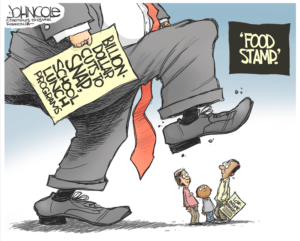The Trump Administration Wants to Make It Harder to Access Food Stamps
The Agriculture Department proposes adding tougher work requirements. (Karen Apricot / Flickr Creative Commons).
(Karen Apricot / Flickr Creative Commons).
Although congressional Republicans failed to increase work requirements for recipients of the Supplemental Nutrition Assistance (SNAP) program (aka food stamps) in the 2018 Farm Bill, on Thursday, the United States Department of Agriculture did what Congress could not: It released a proposed regulatory rule that, if implemented, would, as The Washington Post reports, use the rulemaking powers granted to executive agencies to “force hundreds of thousands more Americans to hold jobs if they want to keep receiving food stamps.”
Over 42 million Americans rely on SNAP benefits to buy groceries to feed themselves and their families. Existing SNAP rules, Vox points out, already include work requirements for adult recipients who are able-bodied, have no dependents and use the program for more than three months in a three-year period. They must work at least 20 hours a week or be enrolled in a job training program.
The USDA, which oversees SNAP, currently allows states to waive those requirements in areas where the unemployment rate is at least 20 percent or greater than the national average of 3.7 percent. The new rules, as proposed by the USDA, would decrease that rate to 7 percent above the current average. They would also limit the use of waivers to a year, as well as limiting the ability to save waivers and use them in the future. The Post reports that “Approximately 2.8 million able-bodied recipients without children or an ailing person in their care were not working in 2016, according to the USDA’s latest numbers.”
Under the new proposal, the Post adds, “Roughly 755,000 [people] live in areas that stand to lose the waivers.”
Agriculture Secretary Sonny Perdue touted the benefits of the rule on a press call, saying, as NPR reported, “These actions will save hard-working taxpayers $15 billion over 10 years.”
He also claimed that the new rules would restore “the dignity of work to a sizeable segment of our population,” and that the changes would make the Farm Bill in general more palatable to President Trump.
Congressional Democrats however, criticized the plan, and, as the Post writes, “questioned whether the administration had a legal basis to authorize it.”
Debbie Stabenow, D-Mich, the ranking member on the Senate Committee on Agriculture, Nutrition and Forestry, told the Post that “Congress writes laws, and the administration is required to write rules based on the law.” She added, “Administrative changes should not be driven by ideology. I do not support unilateral and unjustified changes that would take food away from families.”
Republicans have long argued that the approximately $70 billion SNAP program is too expensive, inefficient and discourages Americans from finding work.
Outgoing House Speaker Paul Ryan, R-Wisc., proposed turning the flexible SNAP program into a block grant, with strict limits on funding for each state, and terms set by each state. Others have proposed drug testing recipients, and kicking them off the rolls should they fail. In a September 2015 Politico interview, Senate Majority Leader Mitch McConnell said business leaders complain of hiring shortages, telling him they have “a hard time finding people to do the work because they’re doing too good with food stamps, Social Security and all the rest.”
SNAP’s defenders counter that, as Vox has argued, “SNAP is a program ” A 2017 update to a 2013 USDA report said that “[the agency] has seen declines in the rate of trafficking from four percent down to about one percent of benefits over the last 15 years.”
James Ziliak, the director of University of Kentucky Center for Poverty Research, told Vox that “The evidence shows that the program actually works. Not all programs work. But SNAP actually is one of those that does what it is supposed to be doing.”
The rule will be posted to the Federal Register, and the public will have 60 days to comment.
Your support is crucial...As we navigate an uncertain 2025, with a new administration questioning press freedoms, the risks are clear: our ability to report freely is under threat.
Your tax-deductible donation enables us to dig deeper, delivering fearless investigative reporting and analysis that exposes the reality beneath the headlines — without compromise.
Now is the time to take action. Stand with our courageous journalists. Donate today to protect a free press, uphold democracy and uncover the stories that need to be told.






You need to be a supporter to comment.
There are currently no responses to this article.
Be the first to respond.